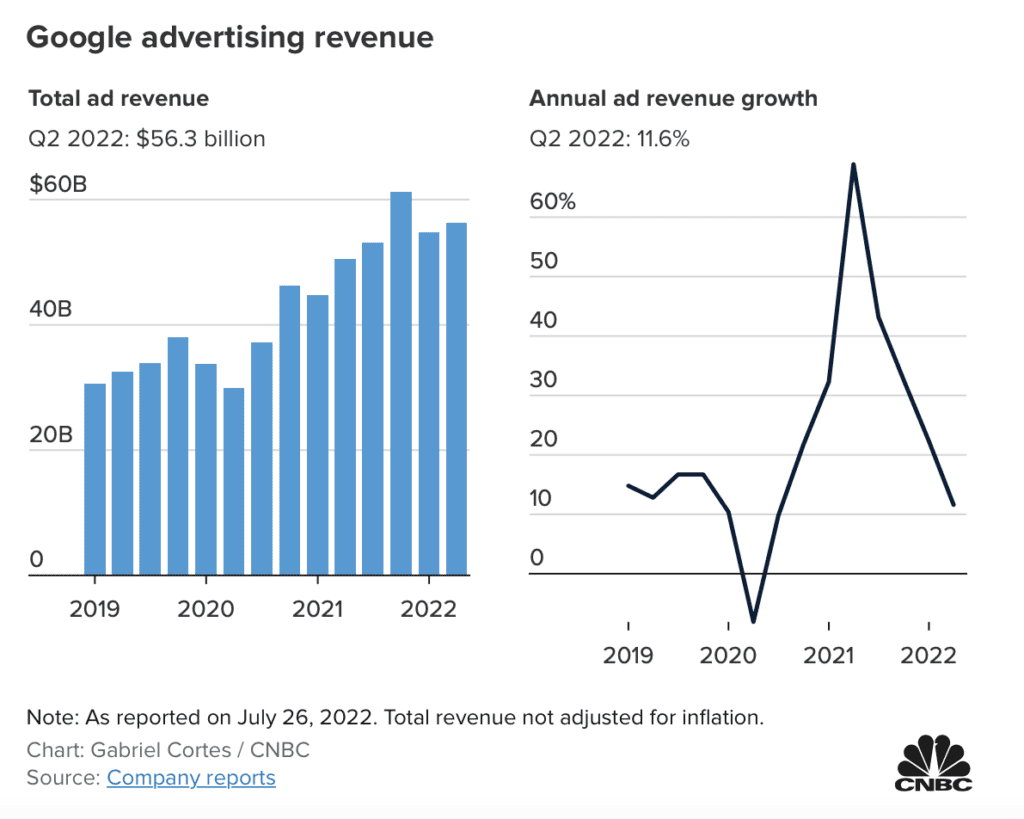To no one’s surprise, Google announced that the company is postponing its plans to kill third-party cookies on Google Chrome. The deadline, originally scheduled for 2022, will now be late 2024. If this news seems familiar to you, you are not alone. In 2021, Google announced a delay to 2023, but now 2023 no longer is feasible.
Why?
The problem for Google comes down to the reality that the company raked in more than $209 billion in advertising revenue in 2021.
As a result, Google needs to proceed very carefully in its phasing out of third-party cookies, which advertisers use to serve up targeted ads to people by tracking their browsing habits across the web. The fact that Google announced the delay after it disclosed subpar quarterly earnings shows just how wary Google is of rocking the boat. To protect its advertising business, Google must:
- Come up with an alternative to third-party cookies that will satisfy advertisers. If Google fails to do that, Google will lose business to competitors such as Amazon Ads. Amazon Ads deliver targeted ads based on their own data beyond the reach of Google’s privacy controls. And Amazon Ads isn’t the only one, as I blogged recently.
- Mollify regulators. Because Google is the largest online ad platform in the world, Google must convince regulators that its consumer privacy changes won’t give Google an unfair advantage. As we blogged in 2021, U.K. regulators have already slowed down Google’s efforts. Regulators are concerned that the demise of third-party cookies could give Google too much power because Google can rely on first-party data on sites such as YouTube (which Google owns) to support its ad business.
Google’s approach to satisfy advertisers consists of the Privacy Sandbox, where Google experiments with alternatives to third-party cookies that enable targeting with stricter privacy controls in place. Those alternatives include:
- Topics, for targeting ads.
- Fledge, for remarketing new ads.
- Attribution reports, for telling advertisers which ads work without compromising consumer privacy.
But it is taking some time for Google to devise solutions as noted above, and not without some considerable trial and effort. For the record, here is Google’s rationale for the delay this time:
The most consistent feedback we’ve received is the need for more time to evaluate and test the new Privacy Sandbox technologies before deprecating third-party cookies in Chrome. This feedback aligns with our commitment to the [U.K. Competition and Markets Authority] to ensure that the Privacy Sandbox provides effective, privacy-preserving technologies and the industry has sufficient time to adopt these new solutions. This deliberate approach to transitioning from third-party cookies ensures that the web can continue to thrive, without relying on cross-site tracking identifiers or covert techniques like fingerprinting.
That rationale underlines both the impact of regulators and the difficulty in developing an answer to third-party cookies.
This latest delay has annoyed advertisers who had been taking measures to adapt to a cookie-less world and now find themselves delaying their plans. Others simply do not like the uncertainty of living in an extended transitional period while Apple enacts privacy control measures of its own. We suggest that for now, advertisers:
- Accept the reality that as third-party cookies crumble and technology companies enact privacy controls, your ads will be less targeted than they were – at least until the industry adapts to alternative tools being developed. This does not mean you should stop advertising online. Online advertising remains the most efficient and cost-effective way to reach your audience.
- Try alternatives beyond Google’s Privacy Sandbox. These include alternative IDs, contextual targeting, and seller-defined audiences.
- Work with your advertising agency to understand what’s happening and how you may be affected. That’s exactly what our clients are doing with True Interactive. That’s what we’re here for.
- Don’t abandon ship with ads that rely on web tracking. As you can see with Google’s announcement, things may not proceed the way Google plans.
- Do invest in ways to leverage your own (first-party) customer data to create personalized ads. We can help you do that.
- Consider ad platforms such as Amazon Advertising and Walmart Connect, which give businesses entrée to a vast base of customers who search and shop on Amazon and Walmart. True Interactive offers services on both platforms in addition to our longstanding work on Google, Bing, and other platforms. Learn more about our services with Amazon Ads here and Walmart here.
One other important consideration: remember, Google is not the only company doing away with third-party cookie tracking. Apple did so with Safari in 2020, and Mozilla with Firefox. The writing is on the wall: it’s time to adapt to a world without third-party cookies. True Interactive can help you do that.
Contact True Interactive
To succeed with online advertising, contact True Interactive. Read about some of our client work here.
Lead image source: https://unsplash.com/@laurenedvalson
For Further Reading
- “Google Introduces New Privacy Controls – Here’s What They Mean,” Mark Smith, May 11, 2022.
- “Who Wants to Play in Google’s Privacy Sandbox?” Mark Smith, April 4, 2022.
- “Google’s Android Privacy Sandbox: Advertiser Q&A,” Tim Colucci, March 12, 2022.
- “Why Google Launched Topics, and What Advertisers Should Do,” Mark Smith, January 25, 2022.
- “Why Google Delayed Its Plans to Scrap Third-Party Cookies,” Mark Smith, June 25, 2021.
- “Google Unlocks First-Party Data for Publishers,” Mark Smith, March 17, 2021.
- “Google Rejects Alternatives to Cookie Tracking,” Mark Smith, March 8, 2021.
- “Google to Stop Supporting Third-Party Cookies on Chrome,” Mark Smith, February 3, 2020.

